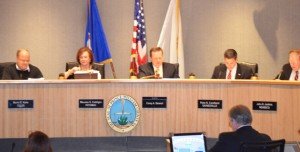
The discussions leading up to the vote on the advertised tax rate of 1.158, which passed seven to one, was contentious, but it provides a glimpse into the supervisor’s priorities for the county.
Frank Principi (D) of the Woodbridge District was the only supervisor to vote against this tax rate. However, the vote only passed after several previous votes had failed.
The new tax rate, should it be adopted, would result in an average tax increase of 5.4 percent. Some supervisors think it will need to be further reduced, while others believe the advertised rate should be adopted as is. Of course, they also want to review the budget and talk to constituents over the next month.
Chairman Stewart wanted to start with last year’s tax rate, although mathematically it would equate an average 7.5 percent tax increase due to increased property assessments. Stewart said there was no way the Board would adopt that high of a tax hike, and he only wanted to start high to have more flexibility. Principi and John Jenkins (D) of the Neabsco district joined Stewart in wanting to start with a higher tax rate. Supervisor Marti Nohe (R) of the Coles District joined in as well.
However, Nohe explained that citizens should not take his willingness to begin with a high tax rates as an indication that he would vote to adopt a similar tax rate. Nohe said the whole business of an advertised tax rate was “academic” as it could always be whittled down at a later date.
But Supervisor Peter Candland (R) of the Gainesville district rejected that interpretation of the tax rate, saying it should be “realistic” so citizens can get an idea of where the Board wants to end up, and have that conversation before the Board votes on the budget.
Joining Candland in advocating for a lower tax rate were Brentsville District’s Wally Covington (R), Occoquan’s Michael May (R) and Potomac’s Maureen Caddigan (R).
Most of those supervisors explained why they felt they could not support a more indulgent budget.
Covington said he was mainly disappointed that the School Board never got around to adopting a zero based budget.
School Board Chairman Milt Johns explained that they have hired an outside consultant to investigate whether zero based budgeting would be beneficial for the school division, and if so, what departments should be looked at. But Covington thought that did not go far enough.
Johns said there was essentially a disagreement on his Board as to the need for zero based budgeting.
Covington also reminded supervisors that funding the jail would have to be a priority as there is really no way around it.
Like Covington, Caddigan accused the School Board of not making sound financial decisions. She said she would have suggested the 2006 bond referendum be used to fund a new aquatic center for the county; she did not approve of the school division building its own school pool and assuming the CIP and operating costs associated with it.
Candland wanted to make sure that people really understood that a flat tax from FY14 would not be “flat” in terms of their tax bill, but would result in a 7.5 percent increase. He said that is the biggest increase the county would have seen in at least 10 years.
Candland and Stewart also got into a scuff, with Candland saying that Stewart's “flat tax” letter to sports league coaches and parents was misleading in that it made it sound as though the taxes would.
However, Candland also questioned the school division as to whether they carry over funds from year to year. Superintendent of Finance and Planning David Cline explained they have to pad their budget in some areas like utilities to take into account the possibilities of bad winters, but did not explain if those savings are passed onto the next year's budget.
Johns said that every year the school division sees more students along with increase in costs due to inflation. They are never fully funded and as a result, there are large class sizes. They are also falling behind on necessary school renovations and keeping up with technology. He clarified that technology refers to communications systems used for school safety, rather than Smartboards and tablet computers.
Stewart also explained the other side of that issue from his perspective. At the beginning of the recession the BOCS not only kept tax bills flat, but actually reduced them. He said it was time they begin to restore funding, especially for community partners. Without such partners as ACT and SERVE, the county would have to provide all those services at a greater cost to the tax payers.
May remained quite on issues, but voted to bring taxes lower along with Candland, Covington and Caddigan.
Support Bristow Beat - Donate Today!